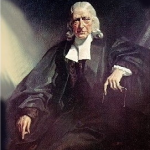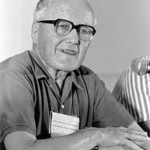What I Mean by Faith
People mean different things when they speak of “faith.” So it’s helpful to clarify. Here is what I mean when I talk about faith or the life of faith.
As I understand it, faith in God (theism, I guess you’d say) is the belief that behind the world we see there is a Power of righteousness, mercy and justice. There is a benevolent, kind and good Creator. God is the reason there is something rather than nothing.
And, atheism would be the denial that any such being exists. The “why there is something rather than nothing” question remains unanswered. Further, in this view, we are here by (enormously unlikely) random chance and there really is no meaning or purpose to any of it. We create meanings where none exist.
I’m not meaning to speak of such an atheistic viewpoint disparagingly — not at all. I can see how a person could come to such a view. It does have a certain simplicity to it. And, to be honest, I can even sympathize with some of the atheist concerns about the dangers and pitfalls of religion. I know them very well. (Though I really think the late Christopher Hitchens was being naive in a way — it is world-views — godless ones included — that threaten to poison everything.)
In this view, the world is a closed system. You could never really know that — but it might be comforting, in a way, to think so. No Being ever intervenes, so you don’t have to worry about that. Things go on as expected. Not everything is fully known or understood — but, in theory, it’s all just a matter of time. We can’t control the world, but if we could describe it and it’s patterns of regularity we could at least have the illusion of control.
But, my thinking goes in a different direction. There are no laws of nature, really. There are regular patterns. We can observe them, describe them, give them mathematical form. But, what are they, really? They are just regular patterns: cause and effect. David Hume, the great philosopher, pointed out that there really is no empirical proof of the relation of cause to effect, either. But, most of us, not being philosophers ourselves, don’t spend any time worrying about that. When we do A, then B has always been observed to follow. That is it. That’s all we know.
As I understand it, there is no natural law that says that, as I sit here typing on my computer, all the molecules of oxygen in this room couldn’t suddenly congregate in one corner of the room, leaving me to suffocate. They don’t, but it’s not as if they couldn’t. It is so incredibly improbable I need not worry about it. Or, to put it another way: it would violate the Law of Entropy. Yeah, right. The Law of Entropy is kind of a joke unto itself: it says that natural processes favor random disorder. Ha! Every day my life is spared by the law of random disorder.
All that lies behind the patterns we see in everyday life are the effects of probability. Underneath the world of regular patterns is a world of chaos and apparent impossibilities.
God can’t break the laws of nature. There’s nothing to break.
 And, what if the impulses within us to love and loyalty really are the keys to understanding the meaning of life? What if that impulse within us that calls us to improve ourselves, to become better persons, is part of the key? What if our moral sense itself is evidence that there is more to life than simply what appears through the senses? What is life is wilder and more amazing than it first appears?
And, what if the impulses within us to love and loyalty really are the keys to understanding the meaning of life? What if that impulse within us that calls us to improve ourselves, to become better persons, is part of the key? What if our moral sense itself is evidence that there is more to life than simply what appears through the senses? What is life is wilder and more amazing than it first appears?
Believing there is a God who created this world — who upholds and maintains it — is a basis for hope. I don’t simply mean a hope for some world to come (remember, anyway, the believers of the Old Testament era apparently didn’t know of a life after death — that’s almost optional), I mean a hope for life in the here and now.
Does such faith bring comfort? Sometimes it does, sometimes it doesn’t.
Yes, I could have the false illusion that I had life and the world figured out. I’d be wrong, but I might think that. How much worse to have the false illusion that I have God figured out.
Faith isn’t easy. It isn’t always comforting. Sometimes faith is the challenge. Maybe I have no comfort because I know I need to change — or because I’m called to some new task — or to some new risk. Sometimes faith is painful because God seems absent and life seems dark. And, in those moments, as the apostle Paul said “… we walk by faith, not by sight.” (2 Corinthians 5:7.)
Such faith challenges my illusions of control. I don’t have life figured out. I certainly do not have God figured out. I see through a glass darkly. (1 Corinthians 13:12.)
And, because faith sharpens our moral sense — giving it new validity — it also sharpens our sense of everything that’s wrong with the world — and with ourselves. We are no longer comfortable with the injustices of life — and statements like “that’s just the way it’s always been” don’t satisfy. There is a higher order than the way it always is!
Nor can we any longer be satisfied with ourselves. We are called to something more than being just a good as the next person. God has always said: you shall be holy, as I am holy. So, we read in the first letter of Peter: “…as he who called you is holy, be holy yourselves in all your conduct; for it is written, ‘You shall be holy, for I am holy.'” (1 Peter 1:15-16 NRSV)
In a sense, I’ve always found faith to be kind of a struggle. It’s not so much a struggle against doubt as with it. Sometimes I thought I understood something and I didn’t. So, it’s evident in those cases that I didn’t doubt enough.
But, there is something more to life than appearances. Beyond all this world — as well as in it — there is a God of righteousness, mercy and justice. And, I know of this God through Jesus Christ. So, through Scripture and prayer and community and service and sacrament I lean forward — pressing forward to understand more and to understand better. Faith is an ongoing journey to understand and to live aright.
Naturally, I don’t know if this makes sense to anyone else. But, that’s what I mean when I talk about faith — and the life of faith.











1 Response